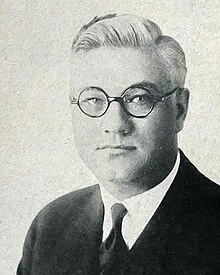George L. Cobb
George Linus Cobb | |
|---|---|
 | |
| Background information | |
| Born | August 31, 1886 Mexico, New York, U.S. |
| Died | December 25, 1942 (aged 56) Brookline, Massachusetts, U.S. |
| Genres | Ragtime |
| Occupation(s) | Composer |
George Linus Cobb (August 31, 1886 – December 25, 1942) was an American composer. He composed over 200 pieces of music, including ragtime, marches, and waltzes. He also wrote columns for music trade publications.
Career
[edit]
Cobb attended the School of Harmony and Composition at Syracuse University in 1905, and his compositions began soon thereafter.[1]
Cobb collaborated with lyricist Jack Yellen on many early songs, and in 1950 Billboard described Cobb as a "roving music teacher" during Yellen's sophomore year in college. They sold their first big hit, All Aboard for Dixieland, for $100 in 1913,[2] but the two had been writing songs as early as 1909, beginning with Moonlight Makes Me Lonesome For A Girl Like You.[3]
Cobb's most famous work is Russian Rag, a composition based on the opening chord progression of Rachmaninoff's Prelude in C-sharp minor, Op.3, No.2. The piece was such a hit in 1918 that Cobb wrote The New Russian Rag in 1923 in an attempt to arrange more of the Rachmaninoff prelude for ragtime piano.[1]
By 1917, Cobb began writing a monthly column titled "Just Between You and Me" in The Tuneful Yankee, a ragtime music magazine owned by publisher Walter Jacobs. The magazine also published many of Cobb's musical compositions. Cobb continued writing for the magazine after the name changed to Melody in 1918.[3]
Selected Discography
[edit]Source:[4]
- American Quartet- All Aboard for Dixieland (1914), Victor
- Billy Murray & Will Oakland- Just For To-night (1914), Victor
- Collins & Harlan- Alabama Jubilee (1915), Victor
- Billy Murray & Irving Kaufman- Are You From Dixie (Cause I'm From Dixie Too) (1915), Victor
- Peerless Quartet- When You're Five Times Sweet Sixteen (1916), Victor
- Peerless Quartet- On Honolulu Bay (1916), Victor
- Earl Rector and the Rector Novelty Orchestra- Russian Rag (1918), Columbia
- Six Brown Brothers- Peter Gink (1919), Victor
Death and legacy
[edit]Cobb died of coronary thrombosis on December 25, 1942.[5]
See also
[edit]References
[edit]- ^ a b Jasen, David A.; Trebor Jay Tichenor (1978). Rags and Ragtime: A Musical History. New York, NY: Dover Publications, Inc. p. 174. ISBN 0-486-25922-6.
- ^ Burton, Jack (November 18, 1950), "The Honor Roll of Popular Songwriters No. 78, Milton Ager", The Billboard, pp. 37–38, retrieved July 31, 2014
- ^ a b Tjaden, Ted (June 2006). "The Rags of George L. Cobb". Retrieved July 31, 2014.
- ^ "George L. Cobb". Discography of American Historical Recordings. Retrieved December 14, 2023.
- ^ Edwards, Bill. "George Linus Cobb". Retrieved July 31, 2014.
External links
[edit]- Free scores by George L. Cobb at the International Music Score Library Project (IMSLP)
- Audio recording of "Russian Rag" at the Library of Congress jukebox
- "Alabama jubilee", New York: Remick Music Corp., 1915, from the Alabama Sheet Music Collection
- The Rags of George L. Cobb An overview of Cobb's life and compositions
- George Linus Cobb An overview of Cobb's life and compositions
